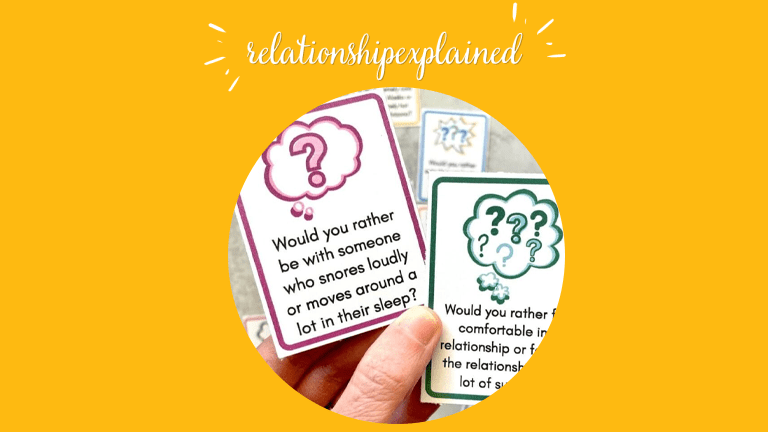Does Weight Matter In A Relationship?
The impact of weight on a relationship requires sensitivity and open communication. Focusing on overall health, supporting each other's progress, and embracing individual differences fosters a positive atmosphere. Mutual understanding and love create a lasting, fulfilling partnership, regardless of weight fluctuations.
Most people often wonder: does weight really matter in a relationship?
It's a topic that sparks a lot of discussion, and it's no wonder why. Our views on body image and what one may find attractive have been changing over the course of time. And that has definitely had an impact on how we see weight in partnerships.
Some folks say weight should have zero impact on a relationship's success, while others think it can affect attraction and intimacy in a major way. The pressures of society and our own insecurities all play into this messy mix too.
So, in this laid-back exploration, we'll dig into the emotional, psychological, and societal aspects of weight in romantic relationships.
10 Ways Weight May Affect A Relationship
Weight, a complex and sometimes sensitive subject, can undoubtedly impact various aspects of a relationship.
From sexual desire and intimacy to emotional well-being and communication, the role of weight in partnerships is multifaceted. It's essential to recognize that each relationship is unique, and the impact of weight can differ widely from one couple to another.
Here are ten ways weight matters in a relationship, shedding light on the importance of understanding and open communication in a partnership.
1. Physical Attraction And Initial Impressions
Physical or sexual attraction often influences the initial stages of a relationship.
Weight, being a visible aspect, can shape how partners perceive each other from the outset. It's essential to recognize that while physical attraction matters to some extent, a meaningful connection goes beyond a certain look.
Partners should strive to appreciate each other's unique qualities, fostering a deeper bond that isn't solely reliant on being physically attracted to each other.
2. Body Image And Self-Esteem
The influence of being overweight on body image and self-esteem can lead to profound effects on an individual's emotional well-being and overall health.
Partners play a crucial role in creating a positive and affirming atmosphere. By offering genuine compliments about their attractive face, recognizing each other's accomplishments, and expressing love beyond being sexually attracted, they can counteract negative self-perceptions.
Emphasizing the value of other qualities beyond physical attraction and shared experiences cultivates a deeper sense of self-worth. This nurturing environment fortifies the couple against the damaging impact of societal beauty standards, promoting self-acceptance and allowing both partners to embrace their authentic selves.
3. Lifestyle And Habits
When partners have diverse lifestyle choices and habits, finding harmony in their routines can present challenges. Balancing disparate eating habits and exercise preferences demands compromise and understanding from both sides. However, this process can be an opportunity for growth and bonding.
By seeking common ground and engaging in activities that both partners find enjoyable, they can not only promote a healthier lifestyle but also strengthen their emotional connection. Embracing each other's individuality and supporting one another's well-being demonstrates a commitment to shared growth and happiness.
Overcoming these differences through open communication and mutual respect contributes to the long-term success and fulfillment of the relationship duration.
4. Emotional Support And Communication
Issues stemming from being morbidly obese can be emotionally taxing, highlighting the need for support and open communication in a relationship.
Romantic partners should cultivate empathy and be active listeners, creating a safe haven for honest dialogue. By offering understanding and refraining from judgment or criticism, they foster an environment where both individuals feel heard and validated. This empathetic exchange fosters mutual understanding and strengthens the emotional bond between partners.
Feeling emotionally secure within the romantic partnership allows for vulnerability, leading to more profound emotional connections. The reassurance of being accepted and supported despite personal struggles engenders a deeper sense of trust. This further strengthens the foundation of the relationship, enabling both partners to navigate challenges together with greater resilience.
5. Intimacy And Physical Comfort
Body weight may influence intimacy and physical comfort, but open communication is key to addressing any concerns or insecurities.
Partners should be honest about their needs and preferences, creating an environment where both feel safe expressing their desires. Understanding each other's boundaries and showing respect for individual comfort levels ensures that intimacy remains a source of connection and pleasure for both partners.
6. Social Perception And External Pressure
Societal perceptions of a higher body-mass index can impact how a couple is viewed by others, leading to potential external pressure and judgment.
Fat people should stand united against societal expectations and embrace their unique bond, regardless of how others may perceive them. By supporting each other through challenging times and celebrating their relationship's strengths, they can overcome external pressures and strengthen their connection.
7. Weight-Related Health Issues
When weight-related health issues emerge, they can profoundly impact both partners in a relationship.
In such trying times, compassion, patience, and teamwork become essential ingredients for navigating these challenges. Supporting each other through lifestyle changes, accompanying each other to doctor visits, and collaborating on treatment plans fosters a profound sense of togetherness.
Demonstrating care and concern for each other's well-being showcases the deep value placed on one another's health. Tackling health challenges as a united front not only strengthens the bond between partners but also fosters resilience in the face of adversity.
Sharing the burden and supporting each other during recovery creates a deep sense of trust, reinforcing the notion that they are on this journey together.
8. Coping Mechanisms
Weight-related issues can lead to unhealthy coping mechanisms, such as emotional or disordered eating, which can make matters worse.
Men and women should be attentive to their partner’s emotional well-being, providing a supportive network to help cope with stress and insecurities. Encouraging healthier outlets for stress relief, such as exercise, mindfulness, or seeking professional help, can promote emotional growth and strengthen the bond between partners.
9. Relationship Dynamics And Power Imbalance
Weight-related insecurities can inadvertently lead to power imbalances within a relationship. A romantic partner with greater self-confidence about their appearance may unknowingly exert control or manipulate the other. It's crucial for both partners to recognize and address any dynamics that undermine equality and ensure that decisions and actions within the relationship are collaborative and based on mutual respect.
10. Growth And Acceptance
Navigating weight-related challenges can be an opportunity for growth and acceptance in a relationship.
Young men and women supporting each other through weight fluctuations, changes, and personal growth shows a deep level of commitment and love. Embracing imperfections and evolving together as a couple creates a strong foundation for a lasting partnership built on acceptance and understanding. And with it comes the desire for mutual growth as they spend time with each other.
How You Can Stay Healthy Together
Weight gain is a common concern that many couples face during their journey together.
As each romantic partner settles into the comfort of a committed relationship, lifestyle changes and shared habits can often lead them to gain or lose weight. While weight is just one aspect of a person's well-being, addressing what caused them to gain weight with sensitivity can foster a healthier partnership.
Let’s explore various tips on staying healthy together while navigating extra weight gain in a relationship, promoting a positive and empathetic approach to wellness.
1. Practice Open Communication
The foundation of any successful relationship is open and honest communication. When discussing weight gain, it's crucial for a potential partner to express their concerns or struggles without judgment or criticism.
Creating a safe space for dialogue allows both individuals to share their feelings and experiences openly. Whether it's expressing a desire to make healthier choices or seeking emotional support during challenging times, open communication strengthens the emotional connection between partners.
2. Focus On Health, Not Appearance
When addressing weight gain, it's essential to shift the focus from appearance to overall health and well-being.
Avoid placing emphasis solely on numbers on the scale or physical appearance. Instead, guys and girls should encourage each other to adopt healthier habits that promote physical and emotional health. Prioritize activities that both partners enjoy, such as cooking nutritious meals together, going for walks, or trying new physical activities that promote active living.
By concentrating on health as a shared goal, the focus becomes more positive and constructive.
3. Set Realistic And Attainable Goals
Avoid setting unrealistic expectations or embarking on the wrong diet or exercise regimens that may not be sustainable in the long term.
Instead, work together to set small, achievable goals that can be accomplished step by step. Celebrate each milestone, no matter how small, and recognize the effort put into making positive changes.
By achieving realistic goals together, partners gain confidence and motivation to continue their journey toward improved health.
4. Encourage Each Other's Progress
Support and encouragement play pivotal roles in the journey to lose weight or a health improvement journey within a relationship.
Partners should celebrate each other's progress, recognizing the dedication and effort invested in making positive changes. By offering words of encouragement and praise, emphasizing the journey rather than just the outcomes, partners create a motivating and uplifting environment.
Being each other's cheerleader instills confidence and boosts self-esteem, inspiring continued commitment to personal growth. The positive atmosphere created by mutual support reinforces the notion that partners are in this together, facing challenges as a united team.
Celebrating even the smallest victories, such as sticking to a new workout routine or making healthier food choices, reaffirms that progress is being made. With unwavering support, male and female partners can navigate their health journeys with optimism and resilience, knowing that they have each other's backs every step of the way.
5. Cook Nutritious Meals Together
Cooking and preparing meals together can be a fun and engaging way to stay healthy as a couple. Experiment with new recipes that incorporate wholesome ingredients, and create and eat healthy meals as a team.
Engaging in shared meal planning and preparation also helps partners understand each other's dietary preferences and needs, making it easier to support healthier eating habits together.
6. Stay Active As A Team
Physical activity not only benefits physical health but also enhances emotional well-being. Find enjoyable activities to do as a couple, such as hiking, biking, dancing, or even attending exercise classes together. Engaging in these activities as a team strengthens the bond between partners and makes staying active a shared experience.
7. Address Emotional Eating Together
Emotional eating, a prevalent response to stress and challenging emotions, can significantly impact individuals and their relationships.
To address this issue in a relationship, it's crucial to create a safe space for open discussions about emotional eating patterns. Partners should encourage each other to share their feelings and triggers without judgment or criticism, fostering understanding and empathy. Together, they can explore alternative coping strategies to deal with emotional triggers, such as engaging in stress-relieving activities like yoga and meditation or pursuing hobbies that bring joy and fulfillment.
By replacing emotional eating with healthier coping mechanisms, partners can not only improve their individual well-being but also strengthen their relationship. The support and teamwork demonstrated in overcoming emotional eating fosters a deeper bond, and partners learn to lean on each other for encouragement and comfort during difficult times. This reinforces the sense of togetherness and emotional intimacy within the partnership.
8. Respect Individual Differences
Remember that each partner's body and metabolism are unique, and gaining or losing weight may vary for each person. Avoid comparing individual progress or results, as it may lead to feelings of inadequacy or resentment. Embrace and celebrate each other's personality and gender differences, recognizing that health journeys are personal and can follow diverse paths.
9. Seek Professional Support If Needed
If weight gain becomes a significant concern or starts affecting overall well-being, consider seeking professional support together. Consulting a registered dietitian, nutritionist, or therapist can provide valuable guidance and strategies to navigate weight-related challenges. Professional assistance can also facilitate open conversations about individual health goals and provide expert advice tailored to each partner's needs.
To Sum Up
Weight can indeed affect a romantic relationship in various ways, but it is essential to approach this aspect of a partnership with sensitivity and understanding. It’s important not to treat obesity as a deal-breaker; instead, approach the issue as if it is something that can be addressed and fixed.
Open communication, empathy, and focus on overall health rather than appearances create a positive and supportive environment for partners to navigate weight-related challenges together. By celebrating each other's progress, embracing individual differences, and fostering a sense of togetherness in the face of health obstacles, happy couples can strengthen their emotional bond.
Ultimately, it is genuine connection, love, and mutual respect that form the foundation for a healthy and thriving partnership, regardless of weight fluctuations.













